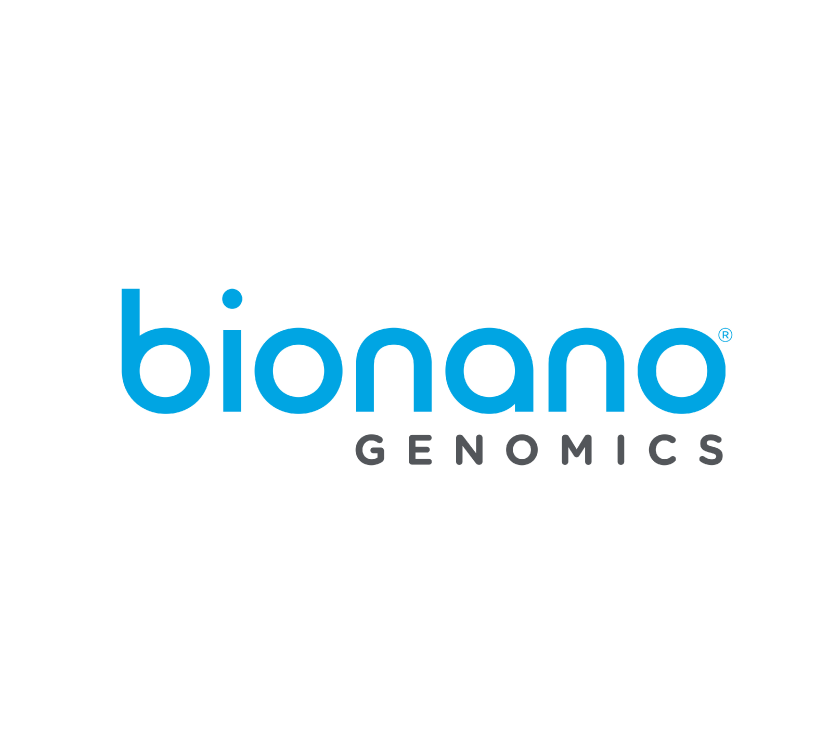
Home > Our Partners > Bionano
Bionano Genomics is a life science company transforming the way the world sees the genome using optical genome mapping for the detection of genome-wide structural variants.
The Saphyr and Stratys systems image ultra-long, linearized DNA molecules labelled at specific sequence motifs. Comparative analysis of the label patterns over long contiguous reads across the whole genome reveals structural variants (>500 bp). All major types of large structural variants can be detected at variant allele fractions of 5%.

The process of Optical Genome Mapping (OGM) commences by isolating ultra-high molecular weight (UHMW) DNA from various sources such as blood, bone marrow aspirates, cultured cells (including chorionic villi and amniocytes), tissue, or tumor biopsies. Subsequently, fluorescent labels are uniformly applied to the genome via a single enzymatic reaction, targeting specific sequence motifs. These labeled DNA molecules are then stretched and aligned within nanochannel arrays on a chip. Utilizing software solutions, changes in label patterning or spacing are meticulously analyzed to accurately detect all types of structural variants (SVs). OGM data can be interpreted independently or integrated with sequencing or array data for comprehensive genomic analysis.

When employing Optical Genome Mapping (OGM), structural variations are directly observed rather than inferred, as is common with next-generation sequencing (NGS). Unlike NGS, where short-read sequences are aligned to reference genomes, OGM images megabase-size native DNA molecules, allowing for direct observation of most large structural variations or their breakpoints within the label pattern on the molecules. Moreover, structural variations can often occur within the repetitive sequences that constitute a significant portion of the genome. NGS faces challenges in accurately assessing variation within and around these repetitive sequences. OGM, however, circumvents these limitations, offering the ability to uncover changes within repetitive regions that may contribute to human disease.
Get a call from your local Decode Science representative to help you find the best fit genomics products for you.
Or give us a call at:
This site uses cookies. By continuing to browse the site, you are agreeing to our use of cookies.
OKLearn moreWe may request cookies to be set on your device. We use cookies to let us know when you visit our websites, how you interact with us, to enrich your user experience, and to customize your relationship with our website.
Click on the different category headings to find out more. You can also change some of your preferences. Note that blocking some types of cookies may impact your experience on our websites and the services we are able to offer.
These cookies are strictly necessary to provide you with services available through our website and to use some of its features.
Because these cookies are strictly necessary to deliver the website, refusing them will have impact how our site functions. You always can block or delete cookies by changing your browser settings and force blocking all cookies on this website. But this will always prompt you to accept/refuse cookies when revisiting our site.
We fully respect if you want to refuse cookies but to avoid asking you again and again kindly allow us to store a cookie for that. You are free to opt out any time or opt in for other cookies to get a better experience. If you refuse cookies we will remove all set cookies in our domain.
We provide you with a list of stored cookies on your computer in our domain so you can check what we stored. Due to security reasons we are not able to show or modify cookies from other domains. You can check these in your browser security settings.
These cookies collect information that is used either in aggregate form to help us understand how our website is being used or how effective our marketing campaigns are, or to help us customize our website and application for you in order to enhance your experience.
If you do not want that we track your visit to our site you can disable tracking in your browser here:
We also use different external services like Google Webfonts, Google Maps, and external Video providers. Since these providers may collect personal data like your IP address we allow you to block them here. Please be aware that this might heavily reduce the functionality and appearance of our site. Changes will take effect once you reload the page.
Google Webfont Settings:
Google Map Settings:
Google reCaptcha Settings:
Vimeo and Youtube video embeds:
The following cookies are also needed - You can choose if you want to allow them:
Simply add your details below and get quick access to the brochure.
Simply add your details below and get quick access to the brochure.
Simply add your details below and get quick access to the brochure.
